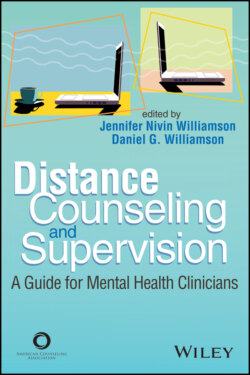Читать книгу Distance Counseling and Supervision - Группа авторов - Страница 16
Anonymity and Confidentiality
ОглавлениеThere are numerous benefits to engaging in distance counseling, including accessibility, anonymity, and comfort and convenience for the client (Harris & Birnbaum, 2015). However, the appropriate degree of anonymity is often uncertain and not always clearly defined. Counseling provided via teletherapy must be held to the same standard as face-to-face practice. ACA (2014) identified the need for counselors to provide adequate information about themselves and the counseling process, obtain informed consent, maintain records, and collaborate with clients around goals and treatment. AMFTRB (2016) established concrete guidelines and notes that “an appropriate therapeutic relationship has not been established when the identity of the therapist may be unknown to the client or the identity of the client(s) may be unknown to the therapist” (Guideline 3.B). This has very specific implications, especially for asynchronous counseling services. The benefit of anonymity and confidentiality primarily lies in a natural sense of what it entails (Harris & Birnbaum, 2015; Richards & Vigano, 2013). Some clients feel less fear of stigmatization seeking counseling services online than traveling to a counselor’s office (McAdams & Wyatt, 2010).
